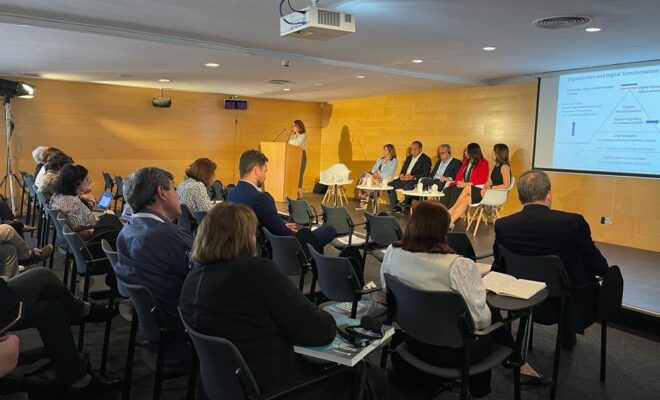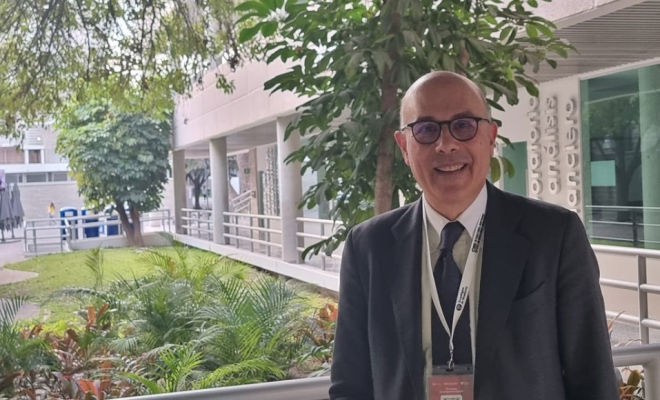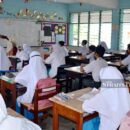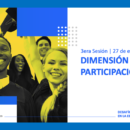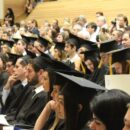Women and girls shared their stories on innovation and higher education

To celebrate the International Women’s Day 2023, UNESCO IESALC held a Fireside Chat on “Women and girls: Innovation and higher education”, on 6 March 2023. The event provided an opportunity to a diverse group of women and girls to explore how they have innovated in their own educational journeys, including but not limited to how to get access to higher education, how to adopt an innovative approach to support learning during tertiary studies, and how to work in innovation-related disciplines at higher education institutions. More than 400 participants have joined the event on Zoom and Facebook Live to listen and engage with the nine invited storytellers representing all five UNESCO regions.
Beyond regional diversity, the nine female participants brought a wide variety of innovative experiences connected to their personal and social contexts. Chuying Huo made a clear statement on the importance of mental health for girls getting through education, showing how her educational initiatives and advocacy include emotional concerns and not only academic productivity. Zuriel Oduwole used two examples of her role as a filmmaker and a presidential advisor to state excellency transcends that we should not underestimate the power of girls and women when they receive equal opportunities.
Chisomo Banda elaborated on the value of a supportive system consisting of parents, friends, and peers in creating the space for girls and women to feel capable to step into a new environment and build interdisciplinarity. Abby Asekun shared her story on how 1MT Cares provides innovative tools for teachers in vulnerable communities to empower themselves and improve the quality of education with a gender-sensitive approach. Juliana Sofia Riaño’s story inspired us on how our innovative journeys are connected to our family stories and deeply grounded on collective work such as peer-to-peer learning and social collaboration projects.
Some stories also stressed the severe challenges that girls and women encounter today. One of challenges, as Un Wa Lok pointed, is gender-stereotyping on girls’ and women’s roles existing not only in men’s mind, but also in the mind of girls and women that end up limiting themselves. This is why one of her main projects is destined to defy cultural norms and restrictions, creating environments that are open to innovative social roles for girls and women. Racheal Kalinaki reminded us that innovation means different things in different contexts.
For girls and women with disabilities, such as herself, she stressed that getting through education is innovative, because it depends on overcoming biases and stereotypes that are added to the gender inequalities. Being a direct witness of the violence regime outbreak in her country, Afghanistan, Aisha Khurram emphasized that education is not a crime and shared her initiatives devoted to creating chances for Afghanistan girls to re-route back to education. Professor Maha, who promotes Artificial Intelligence (AI) among women and girls and is dedicated in attracting more female PhD students in the field of AI, though could not join due to connectivity issue, reminded us once again that digital accessibility is the foundation when discussing gender equality in innovation. To know more, please watch the video: Fireside Chat “Women and girls: Innovation and higher education”.
Not only storytellers, the audiences also expressed their voices through the interactive platform of Menti. According to the results, most people had encountered female role models or mentors in their education, showing that inspiration is an important source of empowerment for girls and women. Teacher-dominated, outdated and lacking innovation were how girls and women described traditional education of their own country, which puts emphasis on the need to develop gender-sensitive innovative learning opportunities. Besides technology, they mentioned more youth involvement in education. As for the main obstacles for girls and women to pursue and succeed in innovative learning, gender inequalities and stereotypes were at the top of the list.
For women and girls to fully engage in innovative learning, what we can do comprises capacity building, infrastructure support, safe and stable internet connection, and platform for exchanging ideas. At the end of empowerment activity, audiences motivated other girls and women pursuing innovative learning by giving advice on being braveness and fearlessness, preserving on one’s passion, listening to the stories from women and girls, and challenging the “norms”.
A very special moment in the conversation was when three participants from the audience took the floor to share their own stories. Ihsanat Suleiman, a teacher from Northeast Nigeria, commented on innovative solutions that enhanced the experiences of both learners and educators, when taking into consideration of different backgrounds within students’ groups. Mariam Temitope Masha, a practitioner and policymaker supporting Nigerian education, stressed the ripple effect that innovative education has had on girls in vulnerable contexts, through a creative and collaborative approach. Brianda Luna, an advocate for the rights of children from Mexico, shared her experience on how extracurricular workshops for girls and boys helped identified issues not visible in formal educational settings, creating a safe environment for sharing and collective learning.
Additionally, UNESCO IESALC shared interventions received through our story campaign, enriching the event’s innovative ecosystem. For example: a young female innovator from Peru created interactive games with crafts and performing arts, to deliver more engaging forms of school evaluation; a post-graduate from Cameroon uses ICT to carry out her daily activities, combining study and work tasks. In China, female learners have introduced “site visit” activities as a part of their learning processes, by visiting cultural sites both physically and virtually to further illustrate and materialize their learning contents.
Three synergies were highlighted among the stories. The first is that innovative learning is an endless process, that ranges from self-contextualized learning to creating startups across sectors and shows a lot of potential for social change. Secondly, innovative tools or techniques should be context-sensitive; they must account for specific learning goals and accommodate personal needs. The third point is that innovative tools and techniques that may improve learning have a big range, from gamification, virtual and augmented reality, to personalized learning and project-based learning.
While women and girls from different communities share their stories on promoting female empowerment, eliminating social stereotypes, creating equal and non-discrimination educational environments for groups with challenging circumstances, the basis is to embrace and push for the needs to study and live safely. 2023 is dedicated to bringing Afghan women and girls back to education. UNESCO IESALC calls for innovative approaches to support further actions to ensure access and quality higher education for Afghan women and girls and to protect the rights of those who work in innovation-related industries!
To conclude the Fireside Chat, Kabelo Botlhe Dikobe from UN Women elaborated on the theme of International Women’s Day 2023: “DigitALL: Innovation and technology for gender equality”. She stressed the importance of education being a right for everyone and should leave no one behind, which means, among other things, to tackle the gender digital divide. World figures show that women and girls still have lower rates of digital literacy and Internet access, numbers that are even more pronounced in In the least developed countries (LDCs), landlocked developing countries (LLDCs), Africa, and the Arab States. Although digital and technical instruments are not the only means to engaging in innovative education, gender inequalities in this field will worsen current divides, blocking opportunities for girls and women to access new forms of education and engage in innovative learning practices.
The Fireside Chat has carried a lot of touching and inspiring moments, yet at the same time reminded us that some barriers and challenges are still waiting for solutions. To promote quality, equal, transparent, and fair education, the discussion on how to move forward together on promoting the role of women and girls in innovation and higher education continues beyond the event.
Special thanks to the Office of the Secretary-General’s Envoy on Youth, UNESCO Division of Education 2030, United Nations High Commissioners for Refugees, UN Women, the United Nations Girls’ Education Initiative (UNGEI), Save the Children, and 1 Million Teachers for joining hands with UNESCO IESALC and making Fireside Chat #IWD 2023 a success!
Please join UNESCO IESALC’s story campaign through sharing a woman or girl’s experience on innovating education for herself or others.
Nominate Yourself
Nominate Others
RELATED ITEMS

